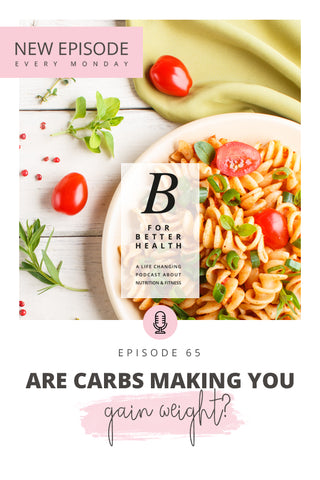Are Carbs Making You Gain Weight? By Baraa El Sabbagh, Sports Nutritionist, Personal Trainer, and Registered Dietician
Nov 02, 2021
The Truth About Carbs
There is so much conflicting evidence out there about carbs: Is it the reason for weight gain? Is there such a thing as a healthy carb? How much is too much? So I decided to compile and break down all the must-have information to share with you guys. Get ready to learn all there is to know about this really important macronutrient.
Not In The Mood To Read? Try The Podcast
We’re all crunched for time, so if you want to learn all about carbs but you’re on the go, head over to the podcast. You can listen to this episode while working out, driving, or doing some chores around the house.
Carbs Are Important For Our Health

By the end of this post, you’ll know why carbs are the first nutrient people cut out when they’re trying to lose weight, if some carbs are better than others, the meaning of carb cycling, and why it’s time to accept carbs with open arms.
Fun Facts About Carbs
- Carbs are one of three macronutrients our bodies need, the other two are protein and fats.
- Carbs are everywhere. You can find carbs in fruits, vegetables, dairy, grains, legumes, sweets, and sodas. Sometimes we might think we’re on a low or even no carb diet, not realising that it’s in the milk in our coffee or the apple we had for a midday snack.
- Carbs are divided into 2 types: complex carbs which are made of starches & fibers and simple carbs which are simple sugars.
When Do Carbs Make Us Gain Weight?

When your diets are filled with simple carbs, meaning sugars, you will gain weight. So that’s why most people attribute weight problems with all carbs, but the truth is those issues can be remedied by checking the quality and quantity of the carbs you’re eating.
The Benefits Of Carbs
Carbs are feeding the brain, your muscles, and your energy. Their benefits are countless and it’s important to keep them in our lives, in moderation of course. Without carbs, you may experience more fatigued and faint days or low blood pressure, resulting in a sluggish and irritable mood. You know what happens on those days when you don’t eat enough carbs? Your performance may dip during workouts, you don’t have enough energy to complete your errands, or you’re a little snappish at your partner or family members.
Carbs Are Helping Your Muscles

It’s fascinating to think that of all the components that give our bodies energy, our bodies prefer and perform better on carbs! Also known as glucose. Through glucose, your body will function better and increase your muscle’s performance. Carbs are growing your muscles, even though protein is usually the nutrient that gets all the glory in this department.
(Protein also has its own list of benefits and qualities, which you can check out on the blog or podcast!)
If you’re on a muscle gain goal, you’re actually encouraged and required to have more carbs in your day. But before you help yourself to that sixth slice of pizza, you have to remember that not every type of carb will get you to your muscle growth goals. Remember, you need to go for complex carbs, not simple carbs.
What’s The Difference Between Complex And Simple Carbs?

Complex carbs are a great source of sustainable fuel for the body. You’re getting a constant flow of energy when you have complex carbs like:
- Quinoa
- Brown rice
- Oats
- Sweet potatoes
- Bananas
On the other hand, with simple carbs, you’re basically getting a short burst of energy that you’ll use up quickly, followed by a crash and feeling really snacky.
That’s caused from food like:
- Candy, ice cream
- Baked sweets
- Soda drinks
- Packaged cookies
- Fruit juice concentrate
- And breakfast cereals
The reason why complex carbs are healthier, sustain energy, and promote muscle growth is because they’re slow to digest. Meaning it will release energy over a longer period of time for your day’s activities and just generally putting you in a great mood.
P.S. I mention the good mood because it’s backed by science that carbs are the reason you’re happier after a meal!
The Role Of Carbs In Maintaining Weight
What if muscle gain OR weight loss are NOT on your agenda, and you’re happy to maintain where you are at. Should you be including carbs in your diet? The answer is still YES. Around 50% of your daily food intake should include carbs when trying to remain healthy and maintaining your weight.
Why Cutting Carbs Brings Down Weight (Sometimes)

Carbs and water are directly linked to that bloated feeling and a full-looking figure. For every gram of carb in your body, there’s *3* grams of water. Those are the grams that make your body look less lean and shredded. This means you’re retaining water, which is totally fine, it’s just helpful to understand why we’re getting that bloated look from time to time.
So that’s why low carb diets work for a short period of time. If you have a wedding or trip coming up, following a low carb diet in the days leading up to the event might be helpful to shed some water weight, but very temporarily because as soon as you eat carbs again, the weight will come back up.
What Happens On A Long Term Low Carb Diet?
Say goodbye to:
- A healthy and functional metabolism
- An active and energetic lifestyle
- A healthy looking body.
Say hello to:
- More snacking, which will lead to a calorie surplus
- Feeling irritable and groggy all the time
- The eventual binge session when your body will crave carbs SO MUCH that you end up overeating, gaining back all the weight you might have shed
What is CARB CYCLING?
In short, it’s fuelling up on carbs two days a week and cutting down on the other five.
This is a very advanced kind of diet that I really don’t recommend for anyone to do on their own. The way it works is if you work out regularly, especially on the carb heavy days and go light on rest days.
This method is meant to use up your energy from carbs on a kickass, high intensity training session and toning down the carbs on the other days that might not require as much energy from you.
There’s not enough research on the topic and I highly recommend speaking to a dietitian before deciding if carb cycling really is for you.
Why Do Carbs Cause Bloating?

It’s actually due to the fiber-based carbs you’re eating. You’re probably thinking, “Come on Bee, one second you tell us fibers are good for you and then you tell us they’re causing a bloat.”
But it’s true! The whole bloating problem happens when you’ve added too much fiber, too fast to your day. Here’s the trick to avoiding bloating: SLOWLY start adding a few grams of fiber to your diet, one day at a time. That way, you’re getting the nutrients, without the uncomfortable reactions of gas and bloating for too long.
Foods that are very rich in fiber that might be causing this quick discomfort are from things like:
- Whole grains
- Fruits that include the skin
- Veggies like cauliflower and broccoli
- Beans, of course
Gluten Free Does Not Mean Carb Free
Of course, there could be another reason for the bloating, which is an intolerance to gluten or lactose. Gluten is a protein found in carb sources and lactose is a sugar found in carb sources. They are both not bad for you and they both do not cause weight gain. But some people have an actual intolerance. Which means that their body is unable to digest or tolerate them.
The people who have these intolerances tend to have adverse reactions to carbs like extreme diarrhea, gasses, discomfort, and more depending on the case. So, in those cases, the answer wouldn’t be to stop all carbs, it would be to stop the foods that contain gluten.
Same goes for lactose, which is a natural sugar you’d find in your milk, yogurt, or other dairy products. Your body has a special enzyme to break lactose down to sugar, but if your body is missing that enzyme, you're likely to experience stomach aches, diarrhea, and our old friend, bloating.
Always Aim For A Balanced Lifestyle
I’m here to help! One of my favorite tools to create a balanced lifestyle is actually the weight loss course that Mirna and I created that gives you so much more insight into nutrition, macronutrients and so many other aspects that you should look into when following a healthy lifestyle. Check out the full details here and let me know if I can answer any other questions!
Subscribe to one of the top 5 UAE podcasts.
Stay connected with news and updates!
Join our mailing list to receive the latest news and updates from our team.
Don't worry, your information will not be shared.
We hate SPAM. Great content only!


